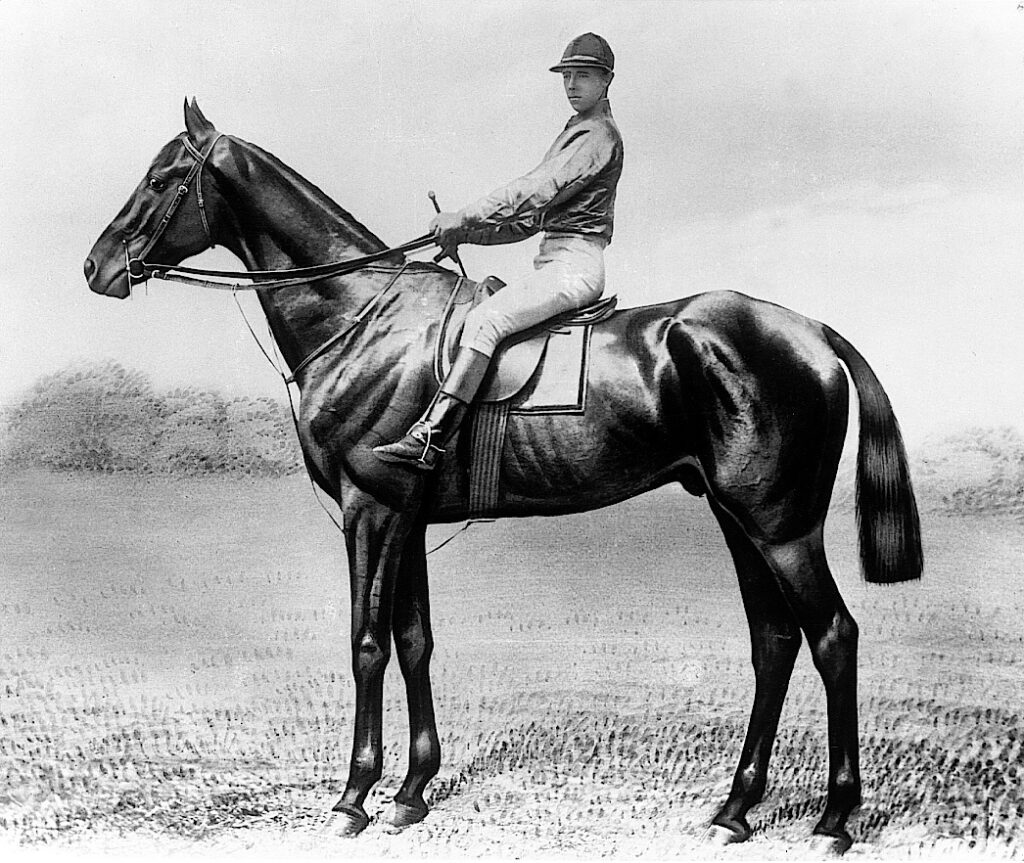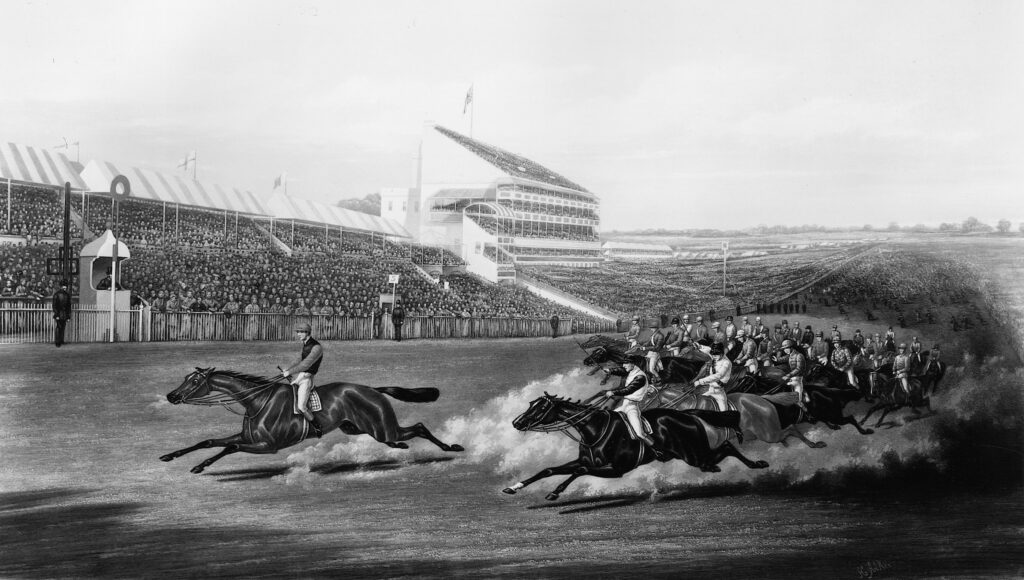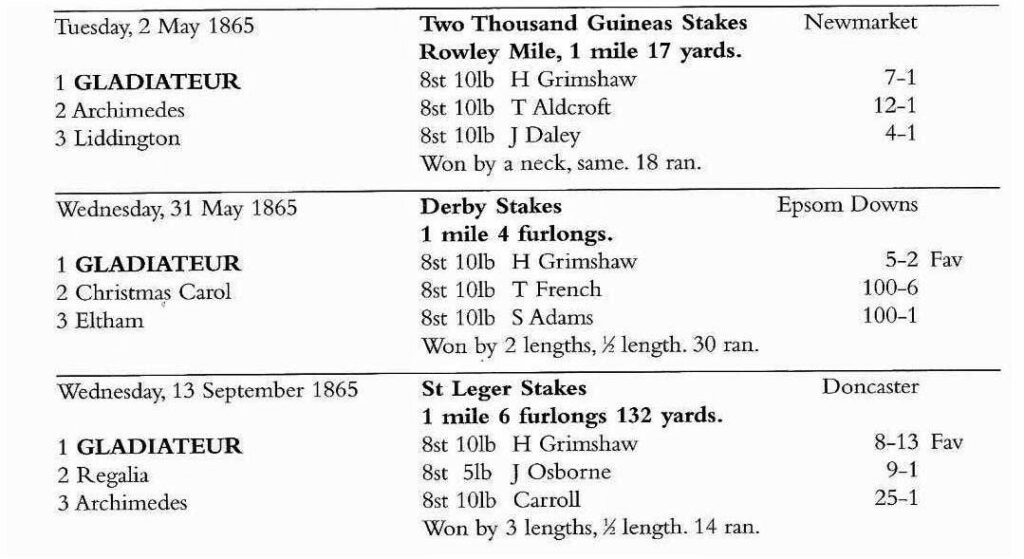In 1865, after Gladiateur became the first French horse to win the Derby, he was heralded in France as ‘The Avenger of Waterloo’.
Gladiateur was bred by his owner Comte Frederic de Lagrange, a son of one of Napoleon’s generals who had inherited a fortune from his father.
Although trodden on as a foal, causing an enlargement in one of the joints of his off-foreleg, Gladiateur’s real problem was navicular disease, which caused intermittent lameness throughout his racing career. He almost certainly inherited this from his dam Miss Gladiator, who was a cripple and could not be trained. His sire, however, was the talented French Triple Crown winner Monarque.
Trained at Newmarket by Tom Jennings, Gladiateur’s two-year-old campaign comprised three races there in October. He made a winning debut in the Clearwell Stakes, beating the useful Joker by a length, then three days later he ran a disappointing dead-heat for third in the Prendergast Stakes. Finally, he ran unplaced in the Criterion Stakes while suffering from a cough.
The following year he became increasingly lame and had to be blistered on both forelegs. However, the Two Thousand Guineas, run later than usual, allowed Jennings valuable time and despite the colt going to post only half-fit he managed to win in a desperate finish, beating Archimedes by a neck with Liddington a further neck away third.
Before the Derby, Gladiateur ran an amazing trial on the Limekilns over one and a half miles, giving Fille de l’Air, the previous year’s Oaks winner and successful in six races that season, 8lb and two other four-year-olds 35lb each. He beat them all with consummate ease.
After that, the Derby became a formality, and Gladiateur cut through a large field from the distance to win easily by two lengths.
Soon afterwards Gladiateur left for Paris where, amid scenes of national fervour, he won the Grand Prix de Paris over one mile, seven furlongs from Vertugadin and Tourmalet. On returning to England he won two races at Goodwood, one a walk-over, before suffering a further bout of lameness.
Although Gladiateur lined up the 8-13 favourite for the St Leger and appeared to win with ease, his great courage carried him through on three legs.
Gladiateur’s Triple Crown
Three further victories, at Doncaster, Longchamp and Newmarket, preceded his final race of the year in the Cambridgeshire, in which he ran unplaced to Gardevisure trying to concede 52lb in a field of 36.
The following season Gladiateur’s legs were worse than ever but despite this, he went over to Paris to win the Grand Prix de l’Imperatrice over three miles one furlong, and a week later, Le Coupe over two miles. He then returned to England to win the Ascot Gold Cup by 40 lengths; for many years this was considered to be the finest performance ever seen on a racecourse.
Finally, Gladiateur revisited Paris to win the Grand Prix de l’Empereur over nearly four miles to beat his old rival Vertugadin easily by 3 lengths, the other two contenders having bolted at the start.
Henry Grimshaw (1841-1866), rode Gladiateur in all three races of his Triple Crown. Born in Lancashire, Henry was apprenticed to John Howe Osborne senior, therefter marrying one of his daughters. In 1859 he won the Cambridgeshire for the Osbourne stable on Red Eagle, carrying 5st 9lb. Short sighted from an early age he occasionally relied on fellow jockey’s telling him where he was in the race. Sadly, he was killed on 4 October, 1866, when his trap overturned in the dark when driving home to Newmarket.
Tom Jennings (1823-1900), trainer of Gladiateur, served his apprenticeship in Chantilly under the eye of his relative Thomas Carter. In 1843, as stable jockey to his elder brother, Henry Jennings, he won the Prix de Diane on Nativa. However, after a serious family disagreement, he packed his bags to train in Northern Italy. In 1851, he returned to France to train for Comte Frederic de Lagrange, and won the 1864 Oaks for him with Fille de l’Air. At Royal Ascot in 1878, he completed a unique treble by training Verneuil to win the Gold Cup, Gold Vase and Alexandra Plate. While in public life, he was instrumental in the building of Newmarket’s two hospitals and the local waterworks.
Gladiateur, clearly one of the all-time greats, retired to the Middle Park Stud at a fee of 100 guineas, but proved a disappointment and died of chronic navicular disease in January 1876.
Nevertheless, he remains the only horse to have won the Triple Crown and the Grand Prix de Paris, and is commemorated by a life-size bronze statute at Longchamp.
For more racing history see Michael’s Books for Sale.
To see Michael’s interviews go to the foot of About Michael


